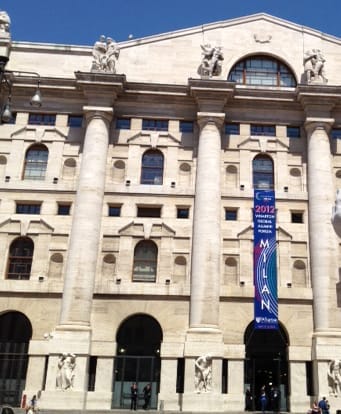In the most recent Economic Outlook from the Organization of Economic Cooperation and Development (OECD), released on May 22, Pier Carlo Padoan, OECD chief economist, declared that the crisis in the eurozone is “the single biggest downside risk facing the global outlook.” The international institution listed five suggestions for stimulating European growth: establishing structural economic reforms, strengthening the firewall to prevent the euro zone crisis from spreading, boosting the European single market, funding more infrastructure projects and leveraging the balance sheets of the European Central Bank.
At the Wharton Global Alumni Forum Milan the week before, Wharton’s Franklin Allen, Nippon Life Professor of Finance, suggested an alternative course: that some countries, such as Spain, could temporarily leave the eurozone. He also said that sovereign defaults, if handled properly, could allow shocks to be handled in the EU. Allen explained that he does not see Europe’s 2011 reforms (the EU Secondary Law) as likely being effective, and that austerity policies do not appear to work either.

Prof. Franklin Allen
Allen’s keynote speech on the first full day of the Milan GAF launched an intellectual debate and interaction that was surely well anticipated by all of the event’s attendees—more than 300 of them on this first day alone.
It kicked off a day replete with stimulating presentations and discourse on a variety of topics ranging from the retail and fashion industries to private equity, strategic sustainability to emerging markets. The second day featured master classes on analytics, universal health care, branding, and the business lessons of sports. Participating faculty included Eric T. Bradlow, K.P. Chao Professor, co-director of the Wharton Customer Analytics Initiative and vice-dean of Wharton Doctoral Programs; Felipe Monteiro, assistant professor of management; Arnold J. Rosoff, professor of legal studies and business ethics and health-care management; Kenneth Shropshire, David W. Hauck Professor and director of the Wharton Sports Business Initiative; and Patti Williams, Ira A. Lipman Associate Professor of Marketing.
Guests also had the honor of an address by Corrado Passera, WG’80, Italy’s minister of economic development, infrastructure and transport.
Ignazio Visco, GR’81, governor of the Bank of Italy, gave the keynote speech that closed Thursday afternoon.
The Milan event was held May 17 and 18. The Wharton School holds annual Global Alumni Forums as a service to its alumni and friends, to provide networking opportunities, strengthen bonds between the School and its alumni, promote Wharton as a center for global business, allow faculty and staff the opportunity to learn more about economies around the world, and, as the Milan event demonstrated, to provide a forum in which global thought leaders can converse.
The next GAF, Wharton Global Alumni Forum Jakarta, will be held June 22 and 23 in Indonesia.
Editor’s note: Knowledge@Wharton published a special report in anticipation of the Milan GAF, including insights from some of the participants. Visit “Europe Struggles to Hold Itself Together” to access all of the report’s content. In our Spring 2012 issue, Wharton Magazine published “At the Corner of Business Economics and Public Policy,” a look at the strong public-policy content at the Wharton Global Alumni Forums this year.

























